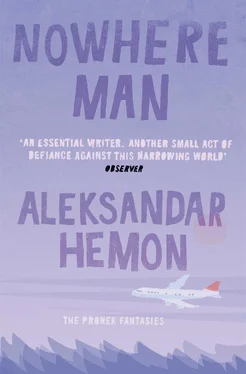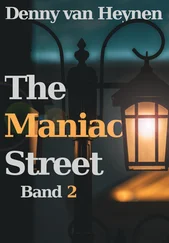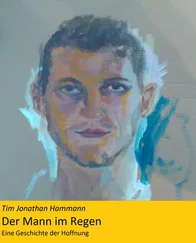Once, desperate for recognition and hoping to justify the financing of the electric guitar, Pronek made the cardinal mistake of performing for his parents. He played the complete Eyes song cycle, midway through which Pronek Sr., comfortable in the armchair, started snoring, which at first sounded like supportive humming — a delusion shattered by a loud oink. Mother Pronek’s face assumed an expression of encouraging interest, her hands in her lap grasping each other, as if preventing an uncontrollable applause, her eyes darting sideways. The final dagger in his artistic heart was her genial applause, waking up Papa Pronek, who leapt from his chair and swiftly assumed a karate fighting stance — a memory of his days in the police school, deeply inscribed in his body, still recurring in his dreams.
Be that as it may, Pronek and Mirza still needed a rhythm section and a name.
But the plans were put on hold when Pronek unexpectedly fell in love. Her name was Sabina — she beamed at him out of the crowd in front of the café-bar called Nostalgija. She gripped her drink with a sunny slice of lemon floating in it, ostensibly talking to a couple of tall potential boyfriends. When her glance first hit him, her eyes huge and strong, blood drove out of his head to the suburbs of his body and he stood paralyzed. The night after the original visual encounter, Pronek recalled in his bed the moment they were connected, respectfully keeping his hands out of the groin area.
Sabina was his schoolmate — he had known she existed and had found her cute, but her gaze suddenly transformed her into an obsession of Pronek’s. He kept going back to Nostalgija , lingering in front of it for warm weeks in September 1983, hoping she would show up. And she did, wearing a light summer dress, her hair ponytailed, her lips carmined and easy to monitor: they touched the brim and squeezed the lemon slice. Pronek could not help feeling stupid, his skin constantly goose-bumped, all his antennas pointed toward her. Sometimes she wore tight white shirts and denim pants and the space around her body curved. He tried to exorcise her before going to sleep by playing the guitar. “Yesterday,” he sang, “all my troubles seemed so far away.” She was ruining his life, he didn’t go out with Mirza anymore, had only fitful phone conversations with him, giving him fallacious reports about the rhythm section search.
Almost every day he would decide to go to Nostalgija no more, and showed up early, before anyone arrived. He would find a position from which he could see her coming up the narrow street, sipping his gin and tonic as if he were sixty (rather than sixteen) years old, his tongue dancing around the lemon. And then she would arrive and the same glance-waltzing would go on, the same torture, his body throbbing with anxiety. Her ankles were delicate, she had the long, elegant fingers of a piano player, she leaned forward when she laughed, pulled back when she asked a question, and her nipples were extremely sensitive to temperature fluctuations.
Finally, he confessed to Mirza what his affliction was. Mirza, it turned out, knew her well — their parents were friends. It was decided that they would go to Nostalgija that night and Mirza would meet her, as if accidentally, and introduce Pronek to her. Pronek spent the night sweating, taking a few showers in the middle of the night, to the bafflement of his father (his mother was fast asleep), who got up to remind him that the electricity used by the water heater was not free of charge. While tossing in bed, as if on a barbecue grill, Pronek confronted the ugliness of his body; he envisioned his face with plantations of pimples stretching toward the horizon of his hairline. He met the pink dawn convinced that anyone who would have such low love standards as to get involved with him must be desperate and not worthy of his attention.
Many years later, in Rolling Meadows, Illinois, while canvassing for Greenpeace, Pronek would for a few instants stand in front of a woman who had Sabina’s eyes. The woman would slam the door in his face, and he would spend the evening remembering that first night, which had commenced with him facing a cruel mirror, drained of hope so thoroughly that he didn’t care anymore. For the rest of the evening he would canvass in a daze that guaranteed many befuddled door-openers and many slammed doors. He would call Mirza in Sarajevo and ask him if he knew where Sabina was. She had lost both of her legs in the breadline shelling, Mirza would say. He saw her on TV, lying in the middle of the mayhem, her husband pressing his torn shirt against her blood-spurting stumps. But he heard she was in Germany now, with her husband and daughter.
Back at Nostalgija , Pronek stands with his hands hanging awkwardly at his sides — too sweaty to be pocketed, too weighty to be moved around in expressive gestures. Mirza is introducing him to Sabina, flanked by two squeaky friends, who keep asking questions he cannot comprehend. The conversation is burdened with unwieldy silences, incomprehensible jokes, and bulky laughs. The only thing Pronek is aware of is her scent — the anchor that keeps him from being blown away by this storm of nonsense — her lemon-and-milk scent coming from the hidden meadows of her skin. He inhales it like a mountain-climber reaching the summit, the world sprawling all around.
He walked her home, up the steep streets of Džidžikovac. They reached her building panting and leaned against the wall, next to beaten-up, pillaged mailboxes, saying nothing. A car drove by and lit a couple clinched on a bench in the park, and they both looked away. Pronek knew that he had to ask her out, since he had gotten this far, but could produce no words. Finally without warning, he grasped her hand and kissed the valley between her middle and index fingers, her ring touching the corner of his mouth. She said: “It took you awhile.” He said: “It always takes me awhile.” With those words uttered, they were officially dating, and were to meet tomorrow night in front of Nostalgija , whereupon they would go to a quiet place to touch each other.
Then came the days of sharp falling in love; of eagerly agreeing with whatever the other had to say; of cautious kisses in the dark halls of her building, Pronek’s palms gliding along her back under her shirt; of pushing through the crowd in front of Nostalgija as a unit. Then months of groping on benches in dark parks, occasionally interrupted by a drunk who fondly remembered his first gropings on the same bench, years ago, and then shared with them the fear of the Medea waiting for him at home. They waited for her parents to go away for the weekend, then ventured into the first penetration in their bed, followed by frantic washing of the bedsheets. They went to parties and danced in clubs, managing to explore each other’s mouths and necks while spinning and jumping. They had romantic nights: candles, wine, sexy songs leading to soft caresses and equal attention to many areas of the body, culminating in lovemaking that made them dizzy and happy to be alive.
Pronek would always remember the moment of seeing Sabina on TV, marching in the opening ceremony of the Sarajevo Olympics, in a snow-white suit, ahead of the Chinese national team, tall and lank and elegant. He could always recall the warmth and tranquillity he felt at that moment, which he would understand as an epiphany of love, a moment that was to become unrepeatable once his world had collapsed.
Then a couple of years of relationshipping. He condescendingly tried to explain to her why Patti Smith was shit. She felt uncomfortable around Mirza, who, she claimed, was checking her out. They spent time with each other’s parents, trying to seem respectful as the parents talked nonsense and made tasteless marriage jokes. They camped at the seaside in the summer, frequently fighting over who was to wash the dishes. She told him that he didn’t understand women, after he tried to explain that he only liked to look at other women, but they didn’t really interest him. He had intermittent bouts of fury, whereby he would destroy things around him — once he snapped in half all the poles his mother used to support her plants and flowers, and Sabina cried, seeing all the flowers bowing down, as if their spines were broken. And a sense sneaked upon them, a sense that love was not enough to keep them together — they sat on a bench on the Vilsonovo and watched deflated soccer balls roiling in a Miljacka whirl. They were eighteen, and felt very old.
Читать дальше












